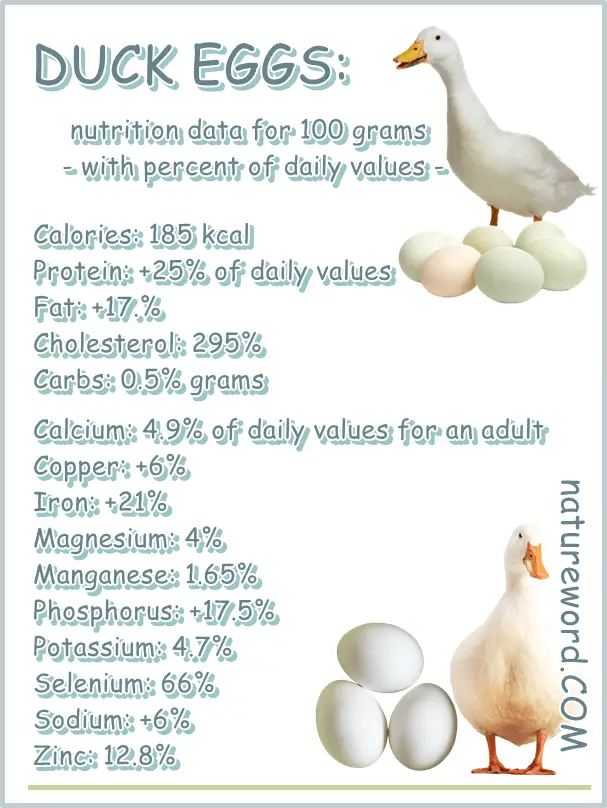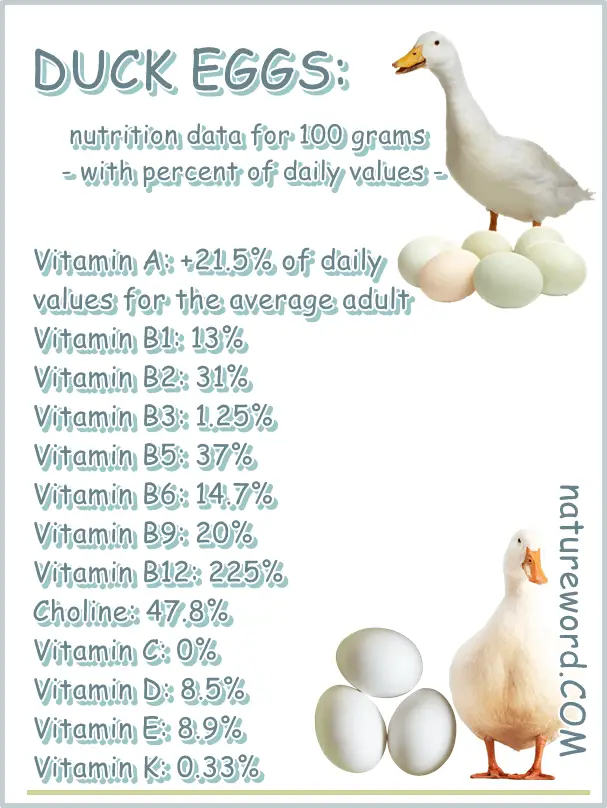Duck eggs have excellent nutritional value and are a nutritionally dense food. But how much nutrition do duck eggs actually provide for a fixed amount of, say, 100 grams? How much of the recommended daily intake of fat, protein, cholesterol, vitamin B12, iron or vitamin K do you get from 100 grams of duck eggs? How many calories and carbs does 100 grams of duck egg get you?
The nutritional values for duck eggs presented below are for whole duck eggs with egg white and egg yolk. The egg yolk contains all of the fat soluble vitamins in the egg, that is, vitamin A, vitamin D, vitamin E and vitamin K2.
The egg yolk also contains about half of the total protein content of the egg, and is higher in B vitamins too, rivaling the egg white in benefits for health.
See the nutrition of egg yolk per 100 grams and compare with the nutrition of egg white per 100 grams.

Duck eggs nutrition chart for 100 grams
Nutrition data for 100 grams of raw duck egg, whole, with egg white and egg yolk.
- Energetic value: 185 kcal (kilocalories, calories)
- Carbohydrates content: 1.45 grams
- Sugar content: 0.93 grams
- Fiber content: 0 g
- Protein content: 12.8 grams
- Fat content: 13.8 grams
- Cholesterol content: 884 mg (milligrams)
- Water content: 70.8 g
Vitamins in 100 grams of raw duck egg:
- Vitamin A: 194 mcg (micrograms) of which 192 mcg retinol (preformed vitamin A)
- Vitamin B1: 0.156 mg (milligrams)
- Vitamin B2: 0.404 mg
- Vitamin B3: 0.2 mg
- Vitamin B5: 1.86 mg
- Vitamin B6: 0.25 mg
- Vitamin B9: 80 mcg
- Vitamin B12: 5.4 mcg
- Choline: 263 mg
- Vitamin C: 0 mg
- Vitamin D: 1.7 mcg
- Vitamin E: 1.34 mg
- Vitamin K: 0.4 mcg
Minerals in 100 grams of raw duck egg:
- Calcium: 64 mg
- Copper: 0.062 mg
- Iron: 3.85 mg
- Magnesium: 17 mg
- Manganese: 0.038 mg
- Phosphorus: 220 mg
- Potassium: 222 mg
- Selenium: 36.4 mcg (micrograms)
- Sodium: 146 mg
- Zinc: 1.41 mg
Nutrition data from USDA.gov.

Duck eggs daily values for 100 grams
Daily values of macronutrients (fat, protein, carbs, cholesterol) for 100 grams of duck eggs, raw:
- Carbs: 0.5% of daily carbohydrate values for the average adult
- Protein: 25.6% of daily protein values
- Fat: 17.7% of daily fat values
- Cholesterol: 295% of daily cholesterol values
- Sugar: while duck eggs have trace amounts of actual sugar, they do not contain any added sugars and do not count towards added sugar values

Daily values of essential vitamins for 100 grams of duck eggs, raw:
- Vitamin A: 21.55% of daily values
- Vitamin B1: 13% of daily values
- Vitamin B2: 31% of daily values
- Vitamin B3: 1.25% of daily values
- Vitamin B5: 37% of daily values
- Vitamin B6: 14.7% of daily values
- Vitamin B9: 20% of daily values
- Vitamin B12: 225% of daily values
- Choline: 47.8% of daily values
- Vitamin C: 0% of daily values
- Vitamin D: 8.5% of daily values
- Vitamin E: 8.9% of daily values
- Vitamin K: 0.33% of daily values
Daily values of essential minerals for 100 grams of duck eggs, raw:
- Calcium: 4.9% of daily values
- Copper: 6.88% of daily values
- Iron: 21.3% of daily values
- Magnesium: 4% of daily values
- Manganese: 1.65% of daily values
- Phosphorus: 17.6% of daily values
- Potassium: 4.7% of daily values
- Selenium: 66% of daily values
- Sodium: 6.3% of daily values
- Zinc: 12.8% of daily values
Also see the nutrition data for one duck egg, with daily values.
Also see the nutrition data for one boiled duck egg, with daily values.
Also see the what is the nutritional value of two boiled duck eggs, with daily values.
